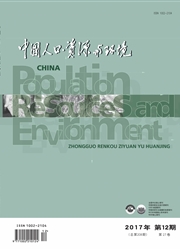

 中文摘要:
中文摘要:
许多发展中国家和地区视旅游业为增加收入和多样化产业结构的捷径。本文中,丽江古城利用淡水资源作为景观用水发展旅游业。近年来。其旅游业快速发展并保持旺盛的增长态势,这种发展情况对优质淡水资源的需求越来越大,在此过程中,古城内水体水质却在下降。对水质恶化的原因和所造成的影响进行详细调查是根本解决目前这种水资源不可持续利用方式的前提和依据。调查结果表明。水质恶化主要是由于古城旅游业发展过程中的不合理因素,如商铺、餐饮店和客栈数量的惫剧增加以及管理失效造成的,并对当地经济、居民生活质量和环境质量产生了负面影响。然后,提出了三条水资源管理措施以应对目前的水污染,促进丽江古城旅游业的可持续发展。
 英文摘要:
英文摘要:
Many developing cotmtries and areas have focused on tourism to generate additional income sources and to diversify the economy. In this paper, Lijiang Ancient Town is described for the use of freshwater resource as attractive landscaping. Tourism in Lijiang has grown rapidly in recent years and is strongly expected to fu~er increase in the future. This development is expected to put additional pressure on the freshwater.resources. An investigation is made into the causes and consequences of water quality deterioration by the tourist industry. The results show that present fashion of water utilization is not sustainable, and parts of the local residents already complain about the water quality degradation. In the future, if the expected increase of tourist number occurs, the pressure on the water quality and amotmt will correspondingly increase. The results could be that the tourism in the area becomes unsustainable, which could have adverse effects on the local economy, local residents life quality and environment consequentially. Therefore, on water-management approach are suggested in order to deal with the current water pollution and make the tourism development sustainable.
 同期刊论文项目
同期刊论文项目
 同项目期刊论文
同项目期刊论文
 Elemental composition in surface snow from the ultra-high elevation area of Mt. Qomolangma (Everest)
Elemental composition in surface snow from the ultra-high elevation area of Mt. Qomolangma (Everest) Source of major anions and cations of snowpacks in Hailuogou No.1 Glacier, Mt.Gongga and Baishui No.
Source of major anions and cations of snowpacks in Hailuogou No.1 Glacier, Mt.Gongga and Baishui No. Environmental significance of snowpit chemistry in the typical monsoonal temperate glacier region, B
Environmental significance of snowpit chemistry in the typical monsoonal temperate glacier region, B Changes of climate,glacier sand runoff in China flsmonsoon altemperat glacier region during the last
Changes of climate,glacier sand runoff in China flsmonsoon altemperat glacier region during the last The chemistry of snow deposited during the summer monsoon and in the winter season at Baishui No.1 G
The chemistry of snow deposited during the summer monsoon and in the winter season at Baishui No.1 G 期刊信息
期刊信息
